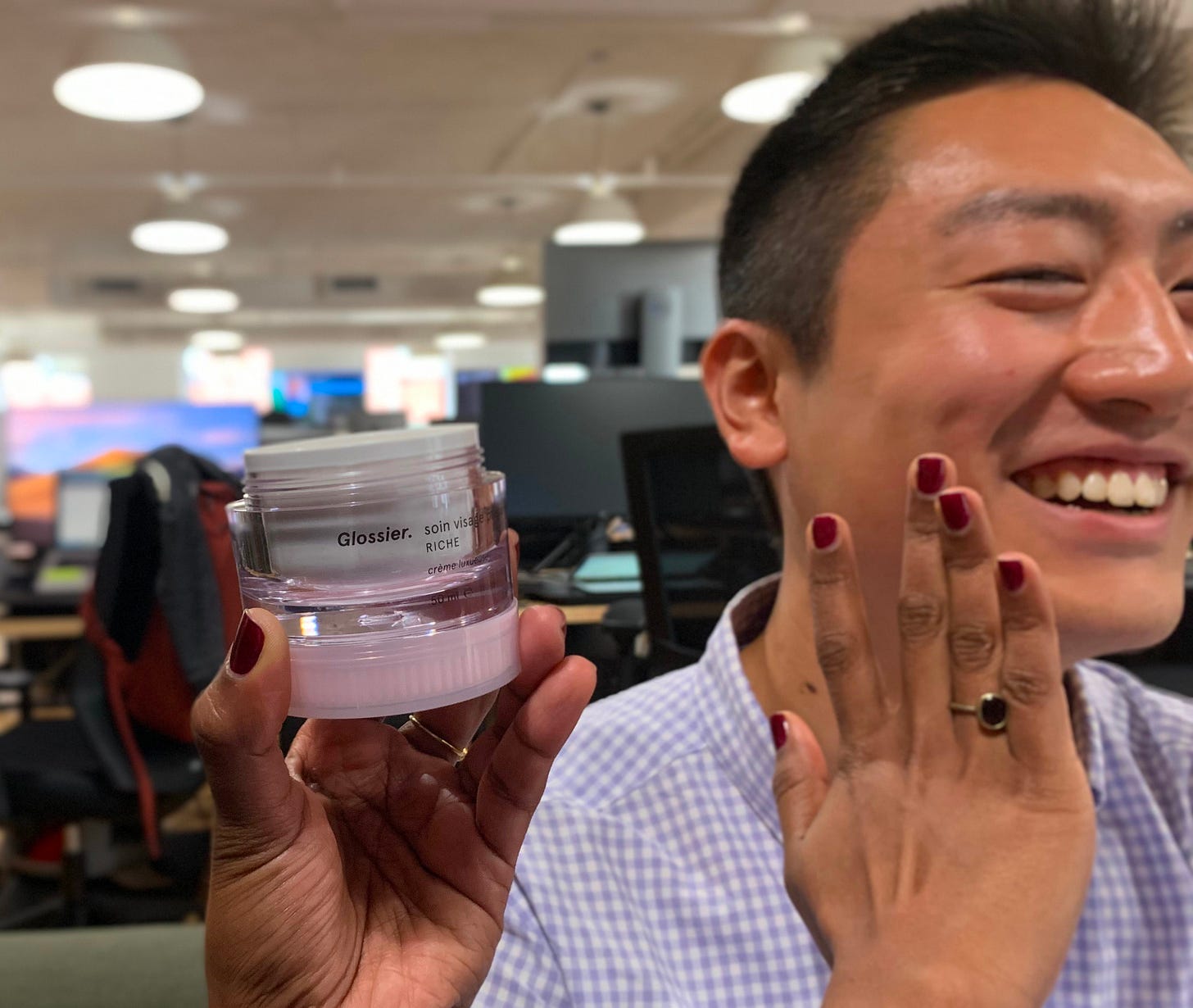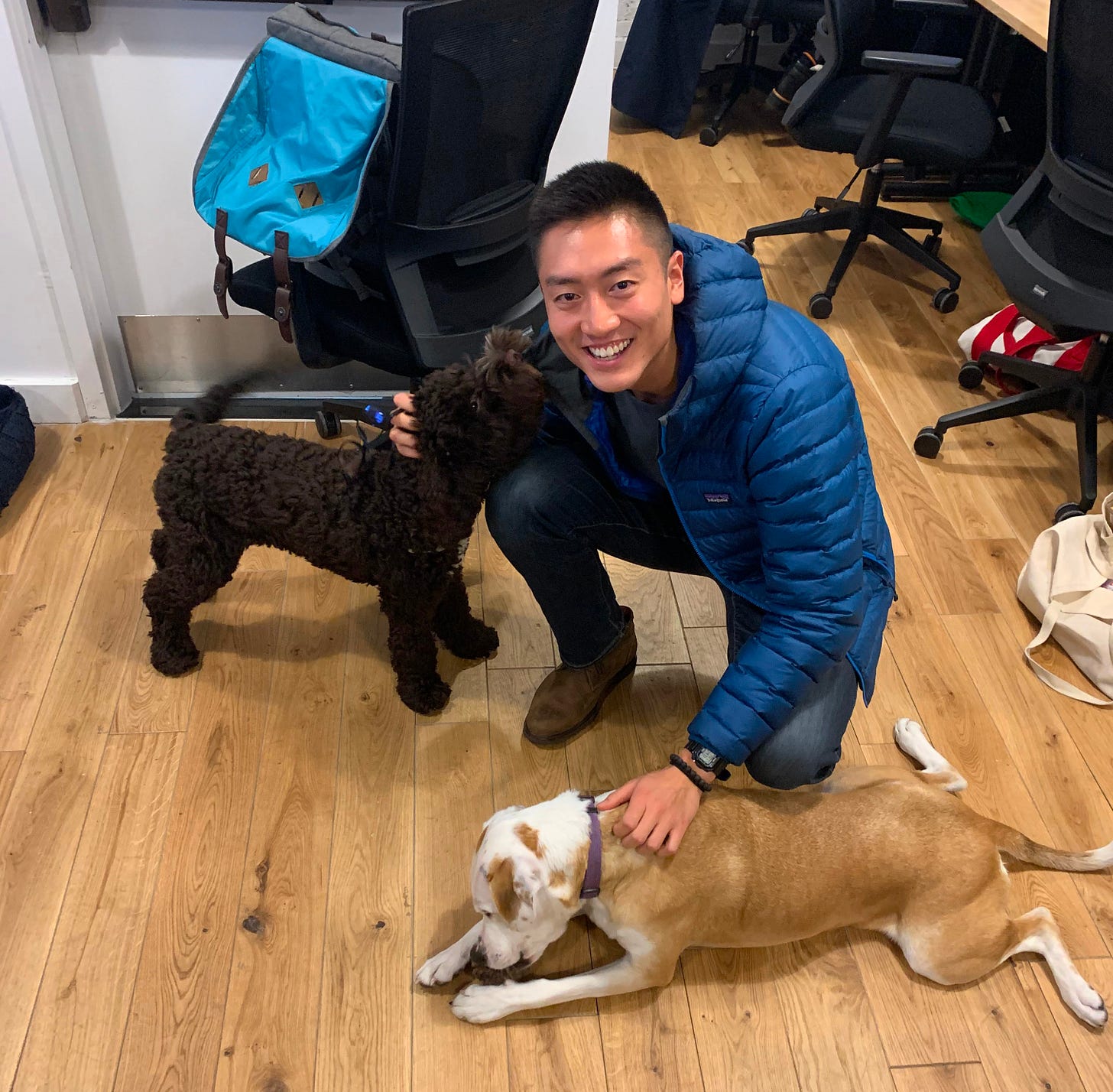Estimated Read Time: 9m 48s
Early in my tech sales career, I chose to get demoted. The experienced haunted me for nearly 4 years. But I wouldn’t be where I am today without it.
The setback forced me to find answers deep within myself. I struggled to make sense of the most humiliating chapter of my professional career.
My inner work journey started around this time. Processing everything was long and painful but I’m also happier, more resilient and fueled by purpose because of what happened.
I hope by sharing my story anyone who’s gone through something similar will be empowered to see their own crises as opportunities.
Here’s how my demotion made me better.
Unstoppable Force Meets (Almost) Immovable Object
When I first started as a Sales Development Representative (SDR), I went from zero cold-calling experience to sleeping in my own private villa for a few nights. I earned a spot at President’s Club where I stayed at Banyan Tree Mayakoba, in Mexico, with my own bicycle, pool, and outdoor bath tub — it’s still the nicest resort I’ve ever stayed at.
I’d approach CEOs offstage after speaking events, show up to offices uninvited with cookies in hand, and triple dial CFOs in a musty phone booth making hundreds of dials before Christmas Eve. Life was great and I was obsessed with sales.
I did so well, I was promoted to become an Account Executive (AE) in nine months, which in tech sales is quite fast. I did great for the first three months but for the next six, I was one of the worst reps on the team. Things went downhill fast.
I left every meeting with my new manager feeling like my brain was put through a blender, which I referred to as ‘the spin zone.’
I remember opening the WeWork sliding door after our 1:1’s, nervously laughing on the way out, shaking my head and silently mouthing ‘what the fuck’, wondering what was going on.
He wanted me to send 2,000 emails a week. I wanted to take a more thoughtful approach.
He left 15 different comments on my calls telling me what I needed to change. I thought there were one or two big things I could improve after each call.
He insisted being on every client conversation and jumped in at random moments. I wanted to bring him in when it made sense and wished he wouldn’t steer things in a different direction.
A word he used often was how I needed to ‘control’ the conversations more. He also said I could be a successful rep, but didn’t know when. I already thought I was successful and was only getting better. He didn’t trust me and his lack of belief messed with me.

We disagreed on every facet of my sales approach, and our working relationship. I was overwhelmed by his criticism and eventually, I caved. I changed my entire sales process and began doubting myself.
The worst part is, I was doing it to appease him, not because I understood his feedback. At one point, I asked him to put me on a Performance Improvement Plan (PIP) so we could get things down on paper and get on the same page. He refused.
I did everything I could to improve my performance, and our working relationship, but after six months of failing to hit my number, I was ready to move on. My underperformance was unacceptable and our dynamic was not productive.
I asked him to speak one day and told him our relationship wasn’t working. I wanted to explore options — not leave the company, per se, but to find a better fit. In a crazy turn of events, the company was performing layoffs that same day. I was on the list.
I built up a good enough brand where the Chief Revenue Officer (CRO) offered me a demotion at the same pay. I could help build out a new team, make the same amount of money for less effort and I thought, ‘maybe my manager was right. Maybe I didn’t know how to sell.’ Oh — and all of this was during the height of Covid.
I didn’t know what a global pandemic was and my confidence was obliterated. I never missed my professional targets before, let alone underperformed. Even in school I had never failed a class. With a crazy international health scare spreading across the world I accepted the offer, justifying it as a ‘lateral move, and the safe bet.
I ended up hitting quota for eight months in my demoted role which gave me some reassurance that I did know how to prospect after all. But attempting to get promoted again was embarrassing. Hiring managers who once respected me looked at me like I was a leper.
What I Learned

George Floyd protests erupted across the U.S. People were upset and our leadership hosted Town Halls so employees could be heard.
Many Black peers, and women, commented on issues beyond Black Lives Matters. They were frustrated about micro-aggressions and being overlooked by peers — how leaders would ignore their suggestions but someone with a louder voice would be acknowledged.
I got flashbacks to all the times I spoke up in meetings and no one turned their heads. Then managers would tell me to speak up because I wasn’t talking enough. The dissonance confused me.
I suddenly realized, as I was listening to my colleagues, their stories resonated with me. I wondered why. I was neither Black nor Female. But then it hit me. We were all minorities. I was Asian, and I had personally experienced these same feelings and experiences before.
The insight sparked a deeper exploration. Was my failure to meet expectations a communication issue? Was I not assertive enough? Was I too assertive? How did my Asian-ness play into all of this? Was it me? My boss? What was I missing? I questioned everything.
I started looking into differences between my Christian and Korean upbringing and typical Western business culture. While these are generalizations, a few include:
Being humble vs promoting yourself
Asians are raised to downplay our accomplishments. Americans are expected to talk theirs up.
Prioritizing the group vs prioritizing yourself
Many Asians go above and beyond for others because it is expected. Individualism is valued in Western culture.
Deferring to authority vs challenging authority
Asians bow to each other. Deference is a show of respect. Americans prefer to project strength with strong handshakes and eye contact.
Indirect communication vs assertive communication
Asians value harmony and ‘saving face’ so saying no and disagreeing is often subtle. Western culture hedges less, and isn’t afraid of open conflict.
I struggled to reconcile how different my values were compared to what was valued in business. I wondered how authentic it was to change how I showed up when everything expected of me was the opposite of how I was raised. My values, identity, and behavior all seemed at odds with the workplace.
Once I recognized how different my values were compared to typical American business culture, I understood my options. I could find environments better aligned with my personality. I could also work on rounding myself out to thrive in situations where I didn’t fit in. Knowing I could develop these skills made me feel better.
By nature, I’m introverted, analytical and critical. I tend to listen more than I speak, and shy away from challenging people in positions of power, especially when they’re older than me.
Challenging prospects felt different because they weren’t my authority figures, but in communities I’ve been a part of, and with bosses, I found it awkward to challenge people I knew. I always got a swift smack as a child whenever I did.
I see now challenging others in American culture is a sign of respect. Of course, when done in a tactful way. Adapting to Western business culture doesn’t mean I am discarding the values I was raised on either. Doing so means I’m adding a different skill set to my toolkit.
I can be humble and promote myself, prioritize the group and myself, defer to authority figures and challenge them. I can be more assertive while still tuning into subtle nonverbal clues. It was never East vs West. It was always East and West.
I came to appreciate my preference for supportive and empowering managers. Leaders who coached instead of dictated. Guided me instead of gave orders. Viewed me as resourceful and worth developing, not incompetent and in need of molding.
I also accepted, my manager wasn’t entirely wrong either. I could have increased my prospecting volume. I could have structured my conversations better. The issue was less in what he had to say, and more in how he was saying it.
He told me what to do, and I didn’t like that. He criticized me so much, I got overwhelmed. He gave me so much feedback, I couldn’t filter his priorities. (Frankly, he couldn’t either, but I digress.)
Even though he could have been a better manager, I could have been a better direct report. Only one of those was in my control. Working with him forced me to level up my communication. I learned to set boundaries and manage up because of him.
Eventually I read Nonviolent Communication too suspecting I’d find all the ways he was an asshole. Turns out, my own self-talk was quite harsh. The book was a revelation in how aggressive my internal critic was and how I was so hard on myself.
Low EQ
Another issue was how disconnected I was from my feelings. I had no clue what I needed and I didn’t have the language to name my emotions. Even though I surrounded myself with people for perspective, I didn’t know how to ask for support. My anxiety went unmanaged and stressed me out.
I was such a people pleaser too. I didn’t realize how much I craved approval and outsourced my confidence to others. Rereading my 2020 journal entires reveal how much I worried about being liked. My self-worth was tied to external validation and doing well. When the reassurance and the results weren’t there, my self-worth crumbled.
I avoided conflict, shrank when challenged, and struggled to assert myself. I resorted to appeasement because I lacked self-conviction. I wanted my manager to give me the confidence I couldn’t give myself. Of course, he didn’t.
Developing my EQ has helped me self-regulate and lean on others. I’ve learned to sit with uncomfortable feelings which allows me to articulate myself better. Asking for support is easier because I accept all of my emotions. I’m more comfortable sharing my highs and lows.
Vulnerability has stopped feeling like weakness and now feels like strength.
Harder, Better, Faster, Stronger
One thing our leadership did well during Covid was turn a massive crisis into our largest catalyst for growth. The CRO told stories of legendary companies who were able to push through adversity and come out on top. He argued while other teams would fail, the best people would rise to the occasion and meet the challenge head on.
We revamped out entire go-to-market (GTM) strategy. We said how now was the perfect time to buy our travel and expense solutions.
Imagine selling T&E during Covid when all travel was banned. Our message was ‘when no travel was happening, timing was perfect to re-evaluate solutions and make changes.’
The narrative worked. We influenced buyers to rethink their travel solutions, created new product lines, raised money to ride out the pandemic, and when travel resumed, revenue exploded. The pivot was a masterclass in how to handle a crisis.
The company took the long term view and made swift decisions to mitigate immediate risks. War rooms were assembled to model out different Dooms Day scenarios and in the midst of an extinction level event, leadership innovated to create new opportunities.
I admired the tenacity, creativity, and decisiveness of our leadership team during what was arguably one of the worst Black Swan events a company could face. Sales went to zero and we reinvented ourselves overnight. I’m glad I stuck around to see how fast transformation can take place at scale.
I questioned my decision to take a step back for a long time. I hated myself for playing small. I wished I could have been more assertive. I resented my manager for criticizing me so much. I bemoaned how my rise to the top was met with an even faster downfall. I got in early at a hyper-growth company and felt my dreams got derailed.
But through it all, I came out a better version of myself. Like the company I worked for, I turned my crisis into a growth opportunity. I improved my emotional intelligence, reconciled cultural gaps and value discrepancies, and I became a better communicator.
I detached my self-worth from feelings, performance, and outcomes — and shifted my attention to what was in my control. I created a stronger relationship with myself and others, and I have a better idea of who I am, what matters, and how I want to show up in the world.
Everything happened for my benefit — even though it didn’t feel that way for a long time. I struggled with my identity and self-worth for years, even before the demotion. The work crisis guided me to the inner work of therapy, coaching, and community — allowing me to heal a lifetime of anxiety, insecurity, and disconnection.
Coaching allowed me to master my mind and my emotions, which is large reason I became a coach. Now I give people the tools to navigate their own crises. I share different perspectives to help clients find new opportunities, provide practices to increase emotional resilience, and rewrite limiting beliefs into empowering narratives.
Throughout this experience, I turned my pain into my purpose, which is why I’m grateful for my demotion.









